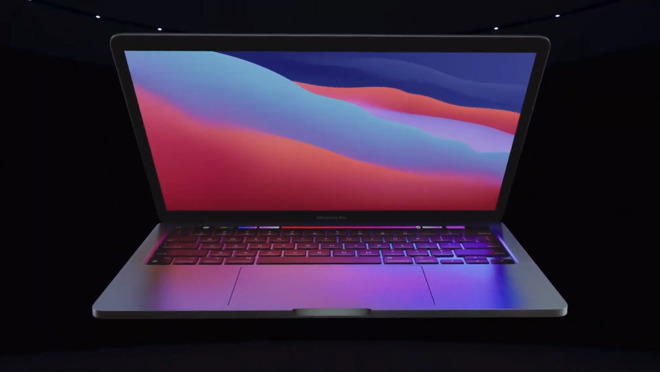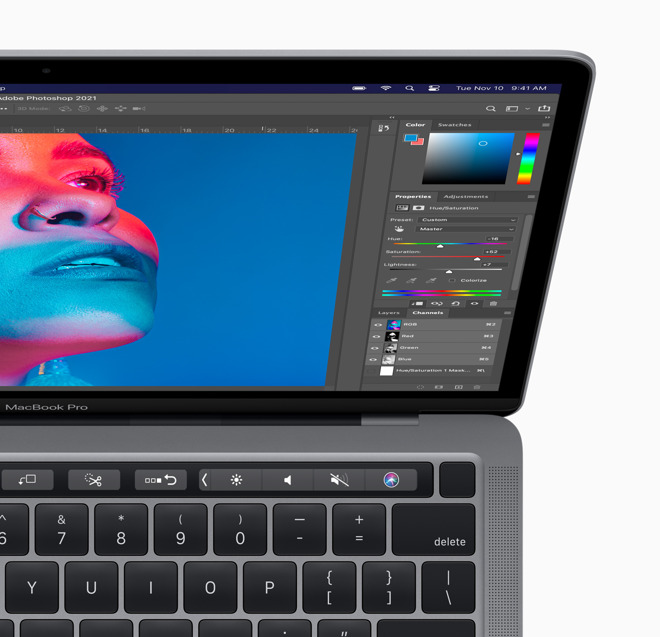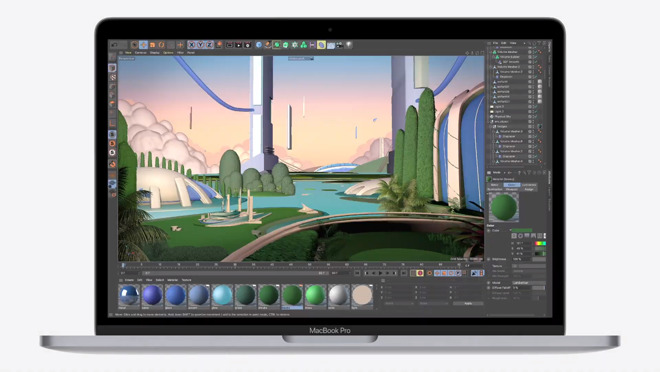Apple unveils new 13-inch MacBook Pro with Apple Silicon M1 for $1299
Apple has unveiled a third hardware refresh during the "one more thing" event, in the form of a new 13-inch MacBook Pro.

The new M1-equipped MacBook Pro
Like the new MacBook Air, the 13-inch MacBook Pro reuses the existing 13-inch MacBook Pro chassis. Apple is using the Apple Silicon M1 chip in the MacBook Pro as well, delivering up to 2.8x faster performance than the existing 13-inch MacBook Pro.
"With M1, our most popular and affordable MacBook Pro dramatically changes your expectations of what a compact pro notebook can do," John Turnus, Apple's vice president of hardware engineering, said at the event.
"With M1, the 13-inch MacBook Pro becomes way more powerful, and way more Pro," Shruthi Haldea, Apple's Mac product line manager, said during the event. "The eight-core CPU delivers up to 2.8 times faster performance. This is game-changing for developers using Xcode, who can now build their apps up to three times faster than before."
Haldea also claimed that the new MacBook Pro offers up to 17 hours of battery life for wireless web browsing, and up to 20 hours for video playbook, which is the most of any Mac in history.

The new MacBook Pro, with the M1 chip
Apple says that the M1 makes it possible for users of the new MacBook Pro to "build code in Xcode up to 2.8x faster, render a complex 3D title in Final Cut Pro up to 5.9x faster, fluidly design intricate game scenes in Unity Editor up to 3.5x faster, [and] Separate out beats, instrumentals, and vocal tracks from a recording in real time in djay Pro AI, thanks to the amazing performance of the Neural Engine."
The new 13-inch MacBook Pro also features two USB 4 ports with Thunderbolt 3 support, versus the four Thunderbolt 3 ports on the Intel 13-inch MacBook Pro. Wi-Fi has been updated to Wi-Fi 6, with Bluetooth 5.0 technology as well.
Like the M1 MacBook Air, the new MacBook Pro is capable of supporting the Apple Pro Display XDR at 6K resolution at 60Hz.

The new MacBook Pro has a eight-core GPU, and uses a fan for active cooling. The MacBook Air is fanless, suggesting that there will likely be better performance on the MacBook Pro versus the MacBook Air with heavy loads.
The 13-inch MacBook Pro is still priced at $1,299, and at $1,199 for education. Those are the same as the prices for the previous MacBook Pro models of that size. As with the Apple Silicon MacBook Air, an upgrade to 16GB of unified memory is available for $200. Upgrades to 1TB and 2TB of SSD storage are available, with the price depending on which base model you purchased.
Preorders for the MacBook Pro are open today.

The new M1-equipped MacBook Pro
Like the new MacBook Air, the 13-inch MacBook Pro reuses the existing 13-inch MacBook Pro chassis. Apple is using the Apple Silicon M1 chip in the MacBook Pro as well, delivering up to 2.8x faster performance than the existing 13-inch MacBook Pro.
"With M1, our most popular and affordable MacBook Pro dramatically changes your expectations of what a compact pro notebook can do," John Turnus, Apple's vice president of hardware engineering, said at the event.
"With M1, the 13-inch MacBook Pro becomes way more powerful, and way more Pro," Shruthi Haldea, Apple's Mac product line manager, said during the event. "The eight-core CPU delivers up to 2.8 times faster performance. This is game-changing for developers using Xcode, who can now build their apps up to three times faster than before."
Haldea also claimed that the new MacBook Pro offers up to 17 hours of battery life for wireless web browsing, and up to 20 hours for video playbook, which is the most of any Mac in history.

The new MacBook Pro, with the M1 chip
Apple says that the M1 makes it possible for users of the new MacBook Pro to "build code in Xcode up to 2.8x faster, render a complex 3D title in Final Cut Pro up to 5.9x faster, fluidly design intricate game scenes in Unity Editor up to 3.5x faster, [and] Separate out beats, instrumentals, and vocal tracks from a recording in real time in djay Pro AI, thanks to the amazing performance of the Neural Engine."
The new 13-inch MacBook Pro also features two USB 4 ports with Thunderbolt 3 support, versus the four Thunderbolt 3 ports on the Intel 13-inch MacBook Pro. Wi-Fi has been updated to Wi-Fi 6, with Bluetooth 5.0 technology as well.
Like the M1 MacBook Air, the new MacBook Pro is capable of supporting the Apple Pro Display XDR at 6K resolution at 60Hz.

The new MacBook Pro has a eight-core GPU, and uses a fan for active cooling. The MacBook Air is fanless, suggesting that there will likely be better performance on the MacBook Pro versus the MacBook Air with heavy loads.
The 13-inch MacBook Pro is still priced at $1,299, and at $1,199 for education. Those are the same as the prices for the previous MacBook Pro models of that size. As with the Apple Silicon MacBook Air, an upgrade to 16GB of unified memory is available for $200. Upgrades to 1TB and 2TB of SSD storage are available, with the price depending on which base model you purchased.
Preorders for the MacBook Pro are open today.

Comments
I've always thought the 13" Pro was the worst-of-both-worlds model, more true now than ever. I'm pretty sure all you get from it is a Touch Bar that most people hate, and a bigger battery… even the RAM options are the same!
oh, I guess the 13" Pro has a fan, so could conceivably turbo-boost a lot longer, better sustained GPU performance.
Macbook Pro M1 13" w/ 16gb RAM and 512gb SSD, $100 cheaper than identically spec'ed Intel
A Series wouldn't be right.
A few things to keep in mind:
1) Apple is navigating a tricky transition. Retaining the current form factor and other specs in some areas ensures that current and recent customers don't feel like Apple has just abandoned them. There are valid reasons for some to have purchased Intel Macs even after the AS announcement. Apple has been the standout company that does right by its customers for years and years. They aren't changing that DNA now.
2) The M series are amazing already. Kind of blown away. Sure in some cases, they are performing 2x the speed of their predecessors, but in others, it's 4, 8, and 10x. the M series low power chips are already Far better for video editors than most desktop class chips from Intel. We recently built a video editing dream machine with the best i9 money can buy. It doesn't handle 4k amazingly well, but performs acceptably in Adobe Premiere. A Mac mini with Final Cut will destroy that.
3) Even better performance-centric M series chips are coming. The larger MacBook Pros, the iMac, the Mac Pro, and whatever else Apple wants to do have a different thermal envelope and will. require more power, which yields much better performance. 8 cores in the M1 isn't a lot. The M2 or M1X or whatever will likely. double up on that.
In conclusion, Apple just opened the door to a bright, new, game-changing era and signaled the death knell of the X86 era for all of computing.
p.s. Already, the M series outpaces its x86 contemporaries by a lot. And that margin will exponentially increase in the coming years. You will see every PC maker follow suit into new RISC CPU designs. Intel would be wise to invest heavily into either its own, custom RISC architecture, or get on the custom ARM bandwagon. Samsung has already tried and failed to gain the upper hand with its mobile CPUs. but they are a waste. of time in this race. The one company I feel somewhat bad for is AMD, who has recently made a resurgence and matching (in some cases exceeding) Intels performance dominance. They enjoy success for a few years and ... AS drops. It's rough. But for us in the. Apple community, it's amazing and encouraging to witness. Wow.
Apple has pledged 7 years of OS upgrades, which is similar to how long they supported PowerPC Macs during the last transition.
I personally wouldn't go near an Intel Mac today, and advise anyone to try to hold out, but buying one is neither crazy or stupid.
2. True
3. True
p.s. is problematic.
The margin will not exponentially increase in the coming years. They are primarily due to A14 being on a 5nm process while Intel's performance chips are on a 14nm process and AMD's performance chips are on a 10nm process. What happens when AMD and especially Intel get to 5nm? AMD's 5nm chips are being manufactured by TSMC for a 2021 release as we speak. Intel has a 7nm design ready but their foundry cannot manufacture it. They are going to decide in 1Q 2021 whether to pay TSMC to manufacture their design or wait another year on their own foundry. They will probably decide to wait a year because their 10nm chips have just hit the market anyway. As for Apple's capacity to improve, they will hit 3nm in 2022. After that, will 2nm be a thing? 1nm? Not likely. After Apple hits 3nm, what will be left is overclocking while using less power.
As for every PC maker following suit into the new RISC CPU designs: why? First off, Intel and AMD are going to narrow, catch up and surpass the A14 when they reach 5nm and 3nm. Second, unless their RISC CPU designs A) surpass the existing Qualcomm and other ARM Holdings-based designs like the M1 chip does, why bother? You may want this to happen in order for Intel to be marginalized - funny how it is only the Apple fans that want every other tech company to go out of business but that isn't going to happen. Wintel is the dominant hardware computing platform in everything but mobile. There isn't going to be this mass abandonment just because ARM is faster, especially since the alternative is Apple machines running a proprietary OS that cost as much as twice as much as Intel and AMD machines with similar specs. And even if they wanted to abandon it, they couldn't. There is too much x86 and x86-64 code - personal, business, enterprise, server - that would need to be rewritten. There is no business or technical justification for such a massive, expensive, lengthy and risky undertaking beyond making Apple fans feel about themselves.
Samsung has already tried and failed to gain the upper hand with its mobile CPUs but they are a waste of time in this race.
Yeah ... more "wishful thinking about Apple's competitors" stuff. The reality is that Samsung worked with ARM Holdings to design the new X1 Cortex super core and has worked with Google to design Whitechapel, Google's new hardware platform for Pixel phones and tablets. The new Samsung Exynos CPUs that used the core that they designed with ARM Holdings will be commercially available in devices in February and it significantly outperforms the Qualcomm 865+. The Qualcomm 875 might outperform it but not by much. In any event, if you are going to make a mobile device or Chromebook, Samsung's chips are going to be as good as any.
So long story short: there will be no mass migration from Wintel to ARM-based Macs because said Macs still cost way more AND the software compatibility problems that already existed for Intel-based Macs that people addressed with Parallels and bootcamp are going to get even worse. You should know from the experience with the iPhone and iPad that faster does not equal market share. The iPhone, the iPad and the Apple TV are all significantly faster than their competitors yet none of them have greater than 35% market share. Apple sold fewer smartphones in the United States - the market where it has the largest share by far - than Samsung last quarter, and they also sold only 5 million fewer iPads than Samsung sold tablets. Give most people the choice between "faster but way more expensive" and "not as fast but still accomplishes everything I need it to do" and they are going to go with the latter. And given that ARM-based Macs are going to have even less software options to "accomplish everything I need it to do" beyond offer desktop versions of iPad apps that were designed to run on touchscreens than the current Wintel ones ... you get the picture. Apple had 8% market share last quarter - ChromeOS had 11% by comparison - in its best quarter for selling Macs ever. Don't think that switching to Apple Silicon is going to move that very much, and for that matter I don't think that Apple is counting on it moving that much either.
M-5 multitronic unit
https://memory-alpha.fandom.com/wiki/M-5_multitronic_unit